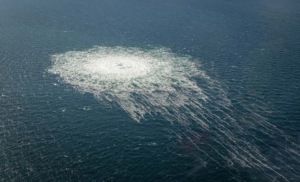News
Germany confident it has located vessel responsible for Nord Stream explosions on Danish island of Christiansø, but no hard evidence yet
This article is more than 2 years old.
It is unclear which country was responsible: Ukraine or Russia? Was it simple sabotage of a false flag operation?

The explosion caused extensive damage to the seabed around Bornholm (photo: Forsvaret)
A German police investigation into the Nord Stream pipeline explosions in the Baltic Sea last September appears confident it has identified and searched the vessel used to carry out the sabotage.
Six individuals were allegedly involved, according to German media outlet Die Zeit, which claims it was chartered by a company based in Poland, which is owned by two Ukrainians.
They sailed from the German port of Rostock and then moored and deserted the boat on the tiny Danish island of Christiansø following the explosions. It was later found by the German police.
It is unclear which country was responsible. Was it simple sabotage of a false flag operation?
Danish Police on the case too
Previously, back in December, the Danish police asked the administrators of Christiansø to help them to establish whether any of the island’s 91 residents saw anything.
“Subsequently, we made a post on behalf of the police on our local Facebook, where we have encouraged our residents on Christiansø to contact us if they have photo or video documentation relating to the specific days in mid-September,” administrator Søren Thiim Andersen told DR.
So far, no solid evidence has emerged. The Danish Police have visited the island to look at anything that might constitute evidence, as well as talking to various inhabitants in a bid to find new clues.
READ ALSO: Nord Stream explosions severely impacted maritime life – report
Lots of rumours in circulation
Several media outlets in Germany, as well as The New York Times, suggest that a pro-Ukrainian group opposed to the pipeline link between Germany and Russia, was behind the blasts.
The Times, meanwhile, contends there is no evidence that the Putin government was involved in the sabotage.
Ukraine’s defence minister, Oleksiy Resnikov, denies his country was involved. His Danish counterpart, Troels Lund Poulsen, meanwhile, said he did not want to “interfere in the case”, according to a statement.










































